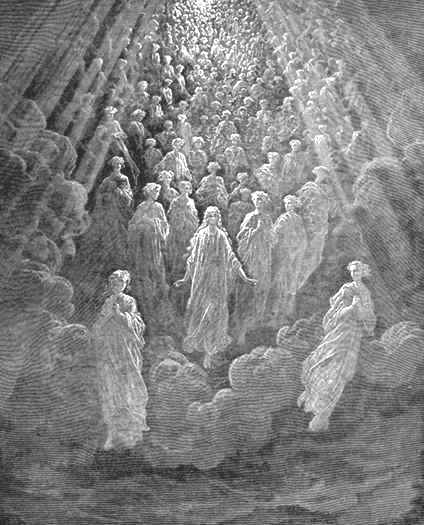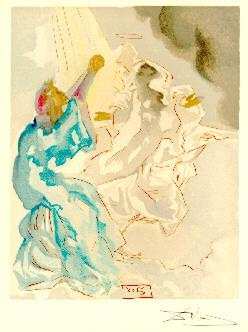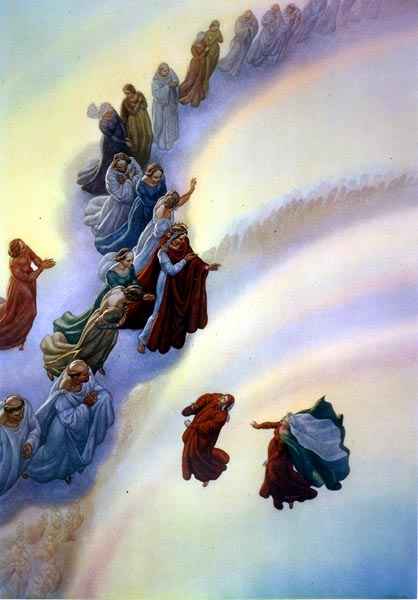 |
 |
 |
|
|
|
|
 |
 |
 |
|
|
|
|
| PAR05 |
|
|
|
|
| ........... | ....... G.GUAITA |
................................. H.W.LONGFELLOW |
...... .D.ALIGHIERI |
....... ... | ....... |
| 1
|
"Se
chi,
al
càud
d'amùr
püsè m'infiàma dla mzüra che pruvè 's pöl là giü 'n tèra, tant che fìn'a l'è trop par i to öc', |
"If
in the heat of love I flame upon thee Beyond the measure that on earth is seen, So that the valour of thine eyes I vanquish, Marvel thou not
thereat;
for this proceeds Well I perceive
how is already
shining |
«S'io
ti
fiammeggio
nel
caldo d'amore di là dal modo che 'n terra si vede, sì che del viso tuo vinco il valore, |
| 4
|
ti
stüpisti
nén
parchè
la
to vìsta 's perfeziòn'a; e quànd la cumìncia ampréndi sémp pü 'n lònche cumprénd l' avànsa 'l pé. |
non ti
maravigliar;
ché ciò procede da perfetto veder, che, come apprende, così nel bene appreso move il piede. |
|
| 7
|
Mi
bén
i
vëd
che
già antla to mént la lùce splénd dla verità etèrna che a, vëdla, vìsca sémp an nùi l'amùr; |
Io veggio
ben sì
come già resplende ne l'intelletto tuo l'etterna luce, che, vista, sola e sempre amore accende; |
|
| 10
|
se
quaicòs
d'àut
al
vos
amùr av dis, l'è 'd cùla veramént numèche n'òmbra che 'd là traspar e mal l'è cunusüa. |
And
if some other thing your love seduce, 'Tis nothing but a vestige of the same, Ill understood, which there is shining through. Thou fain wouldst
know if
with another service This Canto thus
did Beatrice
begin; |
e s'altra
cosa vostro
amor seduce, non è se non di quella alcun vestigio, mal conosciuto, che quivi traluce. |
| 13
|
'T
völi
savéi
se
par
an vut mancà cun na quàic' àuta asiòn 's pöl riparè che fàza séntsi l'ànima sicüra". |
Tu vuo'
saper se
con altro servigio, per manco voto, si può render tanto che l'anima sicuri di letigio». |
|
| 16
|
Cuzì
Beatrìs
l'ha
dat
inìsi
al cant; e mè chi, 'l so parlè l'interòmp nén, l'ha cuntinuà 'l so sant razunamént: |
Sì
cominciò
Beatrice questo canto; e sì com'uom che suo parlar non spezza, continuò così 'l processo santo: |
|
| 19
|
"
'L
pü
gran
regàl
che Dìu l'ha fat a l'om quànd l'ha creàlu, cul püsè cunfùrm a so buntà e da lü püsè apresà, |
"The
greatest gift that in his largess God Creating made, and unto his own goodness Nearest conformed, and that which he doth prize Most highly, is
the freedom
of the will, Now wilt thou
see, if thence
thou reasonest, |
«Lo
maggior
don che Dio per sua larghezza fesse creando, e a la sua bontate più conformato, e quel ch'e' più apprezza, |
| 22
|
a
l'è
dal
nos
vuléi
la libertà; e cùsta i creatüri inteligénti, numèche lur, a iàn avü e iàn. |
fu de la
volontà
la libertate; di che le creature intelligenti, e tutte e sole, fuoro e son dotate. |
|
| 25
|
Da
chi
ti,
razunànd,
at
capirè al gran valùr dal vut se lü l'è fat che Dìu 'l dà 'l cunséns quànd ti 't cunsénti; |
Or ti
parrà,
se tu quinci argomenti, l'alto valor del voto, s'è sì fatto che Dio consenta quando tu consenti; |
|
| 28
|
e
quànd
tra
Dìu
e
l'om as pat sa strénz, 's fa sacrifìsi di 's tezòr che i dis, e pròpi 's fa cun n at ad vuluntà. |
For,
closing between God and man the compact, A sacrifice is of this treasure made, Such as I say, and made by its own act. What can be
rendered then
as compensation? Now art thou
certain of the
greater point; |
ché, nel fermar
tra Dio e l'uomo il patto, vittima fassi di questo tesoro, tal quale io dico; e fassi col suo atto. |
| 31
|
Dònca
che
réndi
's
pöl
par riparè? Se 't crëdi ad fè bon üzu 'd lònche t'òfri, sarìa mè fè 'l bén cun or rubà. |
Dunque
che render
puossi per ristoro? Se credi bene usar quel c'hai offerto, di maltolletto vuo' far buon lavoro. |
|
| 34
|
'Nsal
pü
impurtànt,
sicür
iù
fàti urmài
; ma parchè nu dispénsa Sànta Céza, che zmìa èsi 'n cuntràst cun lònche iù dìti, |
Tu se'
omai del maggior
punto certo; ma perché Santa Chiesa in ciò dispensa, che par contra lo ver ch'i' t'ho scoverto, |
|
| 37
|
cunvén
ta
stàghi
ancùra
'n
poc satà parchè cul mangè grév che ti t'è pià, l'ha bzogn di 'n cèrt aiüt par digerìlu. |
Behoves
thee still to sit awhile at table, Because the solid food which thou hast taken Requireth further aid for thy digestion. Open thy mind to
that which
I reveal, In the essence of
this sacrifice
two things |
convienti
ancor sedere
un poco a mensa, però che 'l cibo rigido c'hai preso, richiede ancora aiuto a tua dispensa. |
| 40
|
Dörv
la
to
mént
a
lònche dès at dig e fìslu bén andrén: as fa nén siénsa se ti 't ritén'i nén lònche t'ampréndi. |
Apri la
mente a quel
ch'io ti paleso e fermalvi entro; ché non fa scienza, sanza lo ritenere, avere inteso. |
|
| 43
|
Ién
esensiài
dùi
ròbi
a
's sacrifìsi: iün'a la ròba l'è che i va par fèla; l'àuta l'è la manéra d'acurdèsi. |
Due cose
si convegnono
a l'essenza di questo sacrificio: l'una è quella di che si fa; l'altr'è la convenenza. |
|
| 46
|
S'
ültima
chi,
l'è
mài
che pöl scanslèsi se nén bén uservàndla; e 'nsal so cünt ròbi precìzi ién stàta dìti prìma: |
This
last for evermore is cancelled not Unless complied with, and concerning this With such precision has above been spoken. Therefore it was
enjoined
upon the Hebrews The other, which
is known
to thee as matter, |
Quest'ultima già
mai non si cancella se non servata; e intorno di lei sì preciso di sopra si favella: |
| 49
|
perciò
mèc
a
i
Ebré
as racumànda dzùra tüt 'd fè ufèrti che, dal vòlti, cambiè lur i pudìvu, mè 't savrè. |
però necessitato
fu a li Ebrei pur l'offerere, ancor ch'alcuna offerta sì permutasse, come saver dei. |
|
| 52
|
L'àuta
che,
parlànd
ciàr,
l'è
la matéria, pöl èsi tal che l'è nén dit sa zbàglia quànd cun n'àuta matéria tlu cambìi; |
L'altra,
che per
materia t'è aperta, puote ben esser tal, che non si falla se con altra materia si converta. |
|
| 55
|
ma
'l
péis
carià,
atént
a tramüdè 'd to vuluntà sénsa avéi di dùi ciàv, al cunséns e dla biànca e 'd cùla giàlda; |
But
let none shift the burden on his shoulder At his arbitrament, without the turning Both of the white and of the yellow key; And every
permutation deem
as foolish, Therefore
whatever thing
has so great weight |
Ma non
trasmuti carco
a la sua spalla per suo arbitrio alcun, sanza la volta e de la chiave bianca e de la gialla; |
| 58
|
e
la
pèrmüta
a
l'è
'd sicür zbaglià, se lònche 't làsi, an cùla che pö 't pìi, cuntnüa l'è nén, mè 'l quàt la sta 'ntal sés. |
e ogne
permutanza
credi stolta, se la cosa dimessa in la sorpresa come 'l quattro nel sei non è raccolta. |
|
| 61
|
Perciò
qualsìasi
ròba
péiza
tant da fè péndi la péiza dla so part, pöl nén cun n'àuta ufèrta sudisfèsi. |
Però qualunque
cosa tanto pesa per suo valor che tragga ogne bilancia, sodisfar non si può con altra spesa. |
|
| 64
|
O
bràva
gént
al
vut,
piè nén sut gàmba; resté fedéi, murtài, fè nén i fòi, mè l'è fat Ieftè cun la so prumësa; |
Let
mortals never take a vow in jest; Be faithful and not blind in doing that, As Jephthah was in his first offering, Whom more
beseemed to say,
'I have done wrong, Whence wept
Iphigenia her
fair face, |
Non
prendan li mortali
il voto a ciancia; siate fedeli, e a ciò far non bieci, come Ieptè a la sua prima mancia; |
| 67
|
l'éra
tant
méi
che
'iù
fat mal' 'l dizéisa che, mantnénd la prumësa, fè 'ncù péc'; n àut fol mè lü, di Gréci 'l capitàni; |
cui
più si
convenia dicer 'Mal feci', che, servando, far peggio; e così stolto ritrovar puoi il gran duca de' Greci, |
|
| 70
|
cuzì
Ifigènia
piàns
par
la
so blësa e piànzi ànche l'ha fat e foj e sàvi ch'iavu santì parlè di 's vut stulëc'. |
onde pianse
Efigènia
il suo bel volto, e fé pianger di sé i folli e i savi ch'udir parlar di così fatto cólto. |
|
| 73
|
Vardè,
Cristiàn,
'd
pensè
prìma
'd decìdi: e 'd nén èsi ligér mè piüma al vént e crëdi che ògni àqua pöl lavèvi. |
Christians,
be ye more serious in your movements; Be ye not like a feather at each wind, And think not every water washes you. Ye have the Old
and the New
Testament, If evil appetite
cry aught
else to you, |
Siate,
Cristiani,
a muovervi più gravi: non siate come penna ad ogne vento, e non crediate ch'ogne acqua vi lavi. |
| 76
|
A
iéi
al
Testamént
e
'l növ e 'l vèc' e dla Céza 'l pastùr che 'v fa da guìda e cust pöl èsi bàsta par salvèvi. |
Avete il
novo e 'l
vecchio Testamento, e 'l pastor de la Chiesa che vi guida; questo vi basti a vostro salvamento. |
|
| 79
|
Se
iéi
dj
idéi
fòli
par la tèsta, fè i òmni sériu e nén al bèstji fòli che i àbji nén 'd fè rìdi ànche i Giüdé. |
Se mala
cupidigia
altro vi grida, uomini siate, e non pecore matte, sì che 'l Giudeo di voi tra voi non rida! |
|
| 82
|
Fé
nén
mè
l'agnèl
che
'l làsa 'l lat ad so màri e 'n po' fol e 'n po' stulëc, al sàuta chi e là fazénd caprìsi!". |
Be
ye not as the lamb that doth abandon Its mother's milk, and frolicsome and simple Combats at its own pleasure with itself." Thus Beatrice to
me even
as I write it; Her silence and
her change
of countenance |
Non fate
com'agnel
che lascia il latte de la sua madre, e semplice e lascivo seco medesmo a suo piacer combatte!». |
| 85
|
Cuzì
Beatrìs
a
mi,
mè
adès va scrìu; pö l'è giràsi tant deziderùza vèrs la part andùa 'l mond a l'è pü viv. |
Così Beatrice
a me com'io scrivo; poi si rivolse tutta disiante a quella parte ove 'l mondo è più vivo. |
|
| 88
|
Al
so
silénsiu
e
'l
so trasfigürèsi la mè mént l'ha pazià che tùrna l'àva di àuti dumàndi avànti ancù da fè; |
Lo suo
tacere e 'l
trasmutar sembiante puoser silenzio al mio cupido ingegno, che già nuove questioni avea davante; |
|
| 91
|
e
mè
na
frècia
tùca
e rìva al sëgn prìma ancù che la còrda la sìa fèrma, 'nti 'n nén, cuzì i pasùma al secònd rëgn. |
And
as an arrow that upon the mark Strikes ere the bowstring quiet hath become, So did we speed into the second realm. My Lady there so
joyful I
beheld, And if the star
itself was
changed and smiled, |
e
sì come
saetta che nel segno percuote pria che sia la corda queta, così corremmo nel secondo regno. |
| 94
|
Chi
iù
vist
la
mè
dòna tant cunténta, pén'a 'ntla lùce di cul cél l'è entrà, che pü splendént l'è vnì fìn'a 'l pianéta . |
Quivi la
donna mia
vid'io sì lieta, come nel lume di quel ciel si mise, che più lucente se ne fé 'l pianeta. |
|
| 97
|
E
se
ridénd
la
stéila
l'ha aumentà la lùce, mè che i dév èsi vnì mi che i son fàcil mè tüt ai cambiamént! |
E se la
stella si
cambiò e rise, qual mi fec'io che pur da mia natura trasmutabile son per tutte guise! |
|
| 100
|
Mè
'nti
n'
àqua
tranquìla
e püra 's vëd che i cùru i pës a lònche i dan da fòra quànd crëdu che l'è ròba da mangè, |
As,
in a fish-pond which is pure and tranquil, The fishes draw to that which from without Comes in such fashion that their food they deem it; So I beheld more
than a thousand
splendours And as each one
was coming
unto us, |
Come 'n
peschiera
ch'è tranquilla e pura traggonsi i pesci a ciò che vien di fori per modo che lo stimin lor pastura, |
| 103
|
cuzì
mi
iù
vist
pü
'd mìla splendùr fèsi vèrs mi e a ugnün ad lur dizìva: "Chi iè chi 'l nos amùr l'aumenterà". |
sì
vid'io
ben più di mille splendori trarsi ver' noi, e in ciascun s'udìa: «Ecco chi crescerà li nostri amori». |
|
| 106
|
E
man
a
man
che
iün ad nùi la vnìva, 's vidìva la figüra èsi cunténta par al pü viv splendùr che 'd lé surtìva. |
E
sì come
ciascuno a noi venìa, vedeasi l'ombra piena di letizia nel folgór chiaro che di lei uscia. |
|
| 109
|
Pénsa,
letùr,
se
cul
che
chi l'ha inìsi, nén avànti l'andéisa, mè 't santrìi 'd savéi püsè 'l turmént dal dezidéri; |
Think,
Reader, if what here is just beginning No farther should proceed, how thou wouldst have An agonizing need of knowing more; And of thyself
thou'lt see
how I from these "O thou
well-born, unto whom
Grace concedes |
Pensa,
lettor, se
quel che qui s'inizia non procedesse, come tu avresti di più savere angosciosa carizia; |
| 112
|
e
't
capirè
da
sul,
mè mi da lur dezideràva 'd sénti i cundisiòn, tost che davànti a i öc' mi iù avìi . |
e per te
vederai
come da questi m'era in disio d'udir lor condizioni, sì come a li occhi mi fur manifesti. |
|
| 115
|
"O
furtünà,
che
a
ti
gràsia 't cuncéd 'd vëdi 'l triònf etèrnu di beàti prìma che la milìsia t'abandòn'i, |
«O
bene nato
a cui veder li troni del triunfo etternal concede grazia prima che la milizia s'abbandoni, |
|
| 118
|
dla
lùce
che
par
tüt
al cél sa zlàrga nùi sùma visc; perciò, se nùi, chi i sùma, 't dezidéri savéi, at sudisfrùma". |
With
light that through the whole of heaven is spread Kindled are we, and hence if thou desirest To know of us, at thine own pleasure sate thee." Thus by some one
among those
holy spirits "Well I perceive
how thou
dost nest thyself |
del lume
che per
tutto il ciel si spazia noi semo accesi; e però, se disii di noi chiarirti, a tuo piacer ti sazia». |
| 121
|
Cuzì
l'ha
dìmi
iün
ad
cuj a spìrit gentìj; e alùra Beatrìs:"Dì, dì sénsa avéi géna e crëd che i pàrla Dìu". |
Così da un
di quelli spirti pii detto mi fu; e da Beatrice: «Dì, dì sicuramente, e credi come a dii». |
|
| 124
|
"Mi
bén
i
vëd
che
'ti, mè che 'nti 'n nì, ''t fàza la lùce che la sort da i öc', andùa la lòzna ansèma al to bel rìdi; |
«Io
veggio
ben sì come tu t'annidi nel proprio lume, e che de li occhi il traggi, perch'e' corusca sì come tu ridi; |
|
| 127
|
ma
chi
t'è,
mi
su
nén e parchè, ànima dëgna, 's post anti sa sféra t'è, ai murtài velà da rag' nén so". |
But
know not who thou art, nor why thou hast, Spirit august, thy station in the sphere That veils itself to men in alien rays." This said I in
direction
of the light Even as the sun,
that doth
conceal himself |
ma non so
chi tu
se', né perché aggi, anima degna, il grado de la spera che si vela a' mortai con altrui raggi». |
| 130
|
Cust
mi
iù
dit
girà
vèrs cù lüm che l'àva a mi parlà; e lé l'è fàsi tant pü lüzénta ad cul ca l'éra prìma. |
Questo
diss'io diritto
alla lumera che pria m'avea parlato; ond'ella fessi lucente più assai di quel ch'ell'era. |
|
| 133
|
Mè
che
fa
'l
sul
che bèli lü sa scond par tròpa lùce quànd al càud cunsüma al vél che i fàvu 'nturn vapùr a spës, |
Sì come
il sol che si cela elli stessi per troppa luce, come 'l caldo ha róse le temperanze d'i vapori spessi, |
|
| 136 | giüst
cuzì
par
l'aumént
ad
cuntantësa sa scond daréra i rag' cula figüra sànta e tüta 'ndrén lé sarà 'm rispond, |
By
greater rapture thus concealed itself In its own radiance the figure saintly, And thus close, close enfolded answered me In fashion as the following Canto sings. |
per
più
letizia sì mi si nascose dentro al suo raggio la figura santa; e così chiusa chiusa mi rispuose |
| 139 | mè 'l dis cantànd al cant che 'l vén adès. | nel modo che 'l seguente canto canta. |